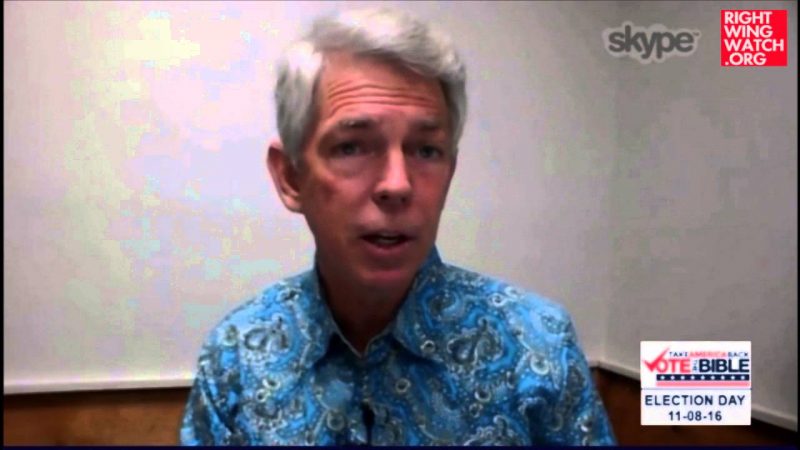Yesterday Eagle Forum’s Court Watch released yet another attack on “Reconstructionist (i.e., ‘activist/liberal’) judges,” who, they claim, “are leading the assault on America’s Judeo-Christian foundations in our nation’s Culture War.” Eagle Forum put together a Sample Resolution for members which the group said can be used as a “weapon” in “an election and at other times when petition-type expressions of our views and values are appropriate.” The resolution begins:
WHEREAS, the Constitution of the United States is, and must be, the Supreme Law of the Land, superior to all court decisions;
WHEREAS, the Constitution must be interpreted in the light of its text, constitutional tradition, and its Judeo-Christian foundation;
WHEREAS, the Constitution contains nothing that requires a “wall of separation between church and state”;
WHEREAS, a total separation of religion and law/government is impossible;
WHEREAS, the Framers of the Constitution did not intend that a total separation be attempted;
WHEREAS, the English Common Law in which American law is rooted was Christianized;
WHEREAS, the U.S. Supreme Court does not require a total separation between “church and state”;
WHEREAS, Reconstructionist (activist/liberal) federal judges have blatantly assaulted these fundamental Constitutional principles and have re-written them under the guise of interpreting them;
AND WHEREAS, We, the people, still possess the ultimate human political power in this nation and have delegated to the President and Congress in the Constitution very broad powers to establish and empower national courts;
BE IT RESOLVED THAT ________ actively supports
1. the Congressional denial of jurisdiction to courts to hear challenges to either the verbal or non-verbal acknowledgement of God — i.e., “God” meaning the Deity central to the Ten Commandments – on public property and in official utterances such as (but not limited to) the Pledge of Allegiance and national motto.
2. Congressional refusal to recognize, fund, or otherwise enforce court decisions that prohibit either the verbal or non-verbal acknowledgement of God — i.e., “God” meaning the Deity central to the Ten Commandments — on public property and in official utterances such as (but not limited to) the Pledge of Allegiance and national motto.
Eagle Forum’s assertion that the Constitution has a “Judeo-Christian foundation” because “the English Common Law in which American law is rooted was Christianized,” appears to challenge the beliefs of Thomas Jefferson, whose “Bill for Establishing Religious Freedom” is widely considered the basis for the First Amendment.
Professor Warren Throckmorton of Grove City College on Tuesday pointed to a letter Thomas Jefferson wrote to Thomas Cooper, in which Jefferson dissects and debunks claims that British common law is based in Christianity. “But Christianity was not introduced till the seventh century; the conversion of the first christian king of the Heptarchy having taken place about the year 598, and that of the last about 686,” Jefferson writes, referring to the common law introduced by the Saxon settlers of England. “Here, then, was a space of two hundred years, during which the common law was in existence, and Christianity no part of it.” He goes on to say:
But none of these adopt Christianity as a part of the common law. If, therefore, from the settlement of the Saxons to the introduction of Christianity among them, that system of religion could not be a part of the common law, because they were not yet Christians, and if, having their laws from that period to the close of the common law, we are all able to find among them no such act of adoption, we may safely affirm (though contradicted by all the judges and writers on earth) that Christianity neither is, nor ever was a part of the common law.
In fact, Jefferson skewers those in England who tried to implement biblical law, much like many on the Religious Right attempt to do today, arguing that the gospel was “intended by their benevolent author as obligatory only in foro concientiae” (obligations of conscience, not law), and that the Ten Commandments were never incorporated into common law:
In truth, the alliance between Church and State in England has ever made their judges accomplices in the frauds of the clergy; and even bolder than they are. For instead of being contented with these four surreptitious chapters of Exodus, they have taken the whole leap, and declared at once that the whole Bible and Testament in a lump, make a part of the common law; ante 873: the first judicial declaration of which was by this same Sir Matthew Hale. And thus they incorporate into the English code laws made for the Jews alone, and the precepts of the gospel, intended by their benevolent author as obligatory only in foro concientiae; and they arm the whole with the coercions of municipal law. In doing this, too, they have not even used the Connecticut caution of declaring, as is done in their blue laws, that the laws of God shall be the laws of their land, except where their own contradict them; but they swallow the yea and nay together. Finally, in answer to Fortescue Aland’s question why the ten commandments should not now be a part of the common law of England? we may say they are not because they never were made so by legislative authority, the document which has imposed that doubt on him being a manifest forgery.








